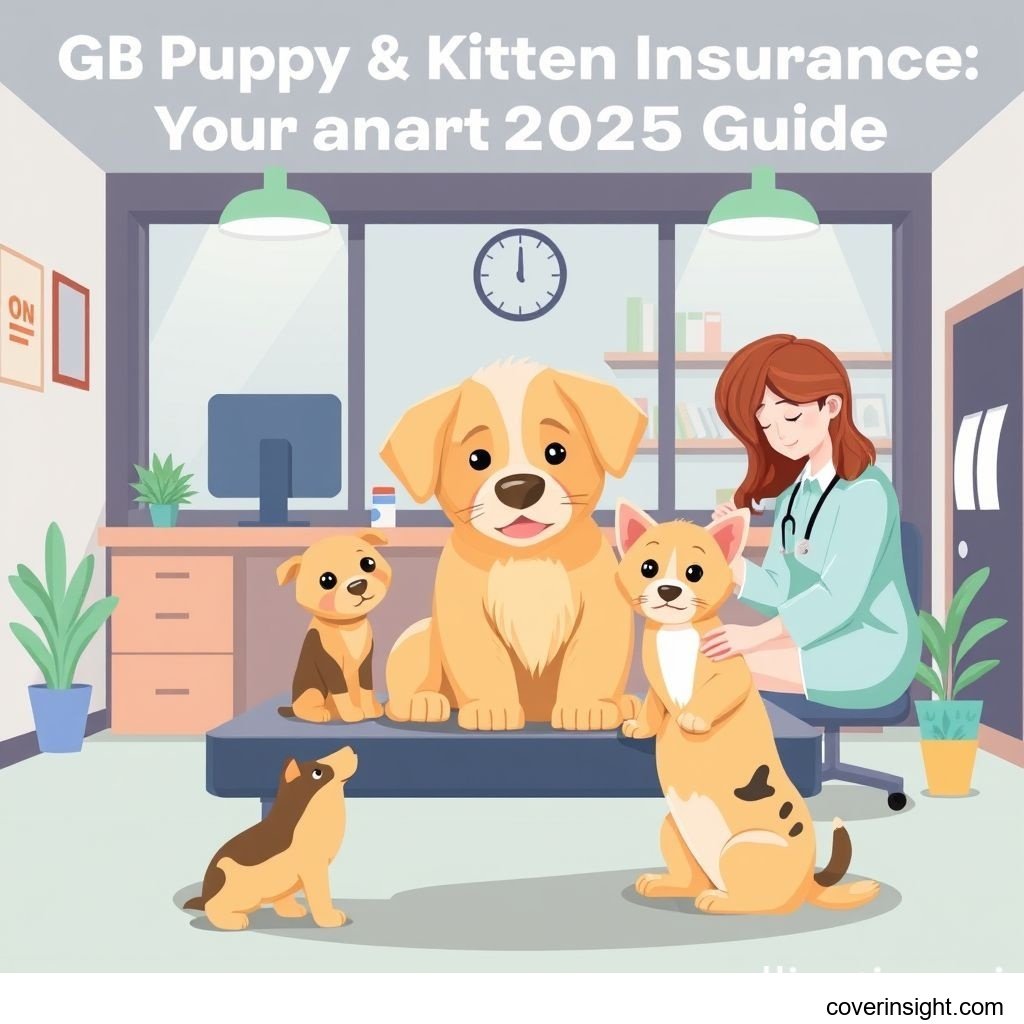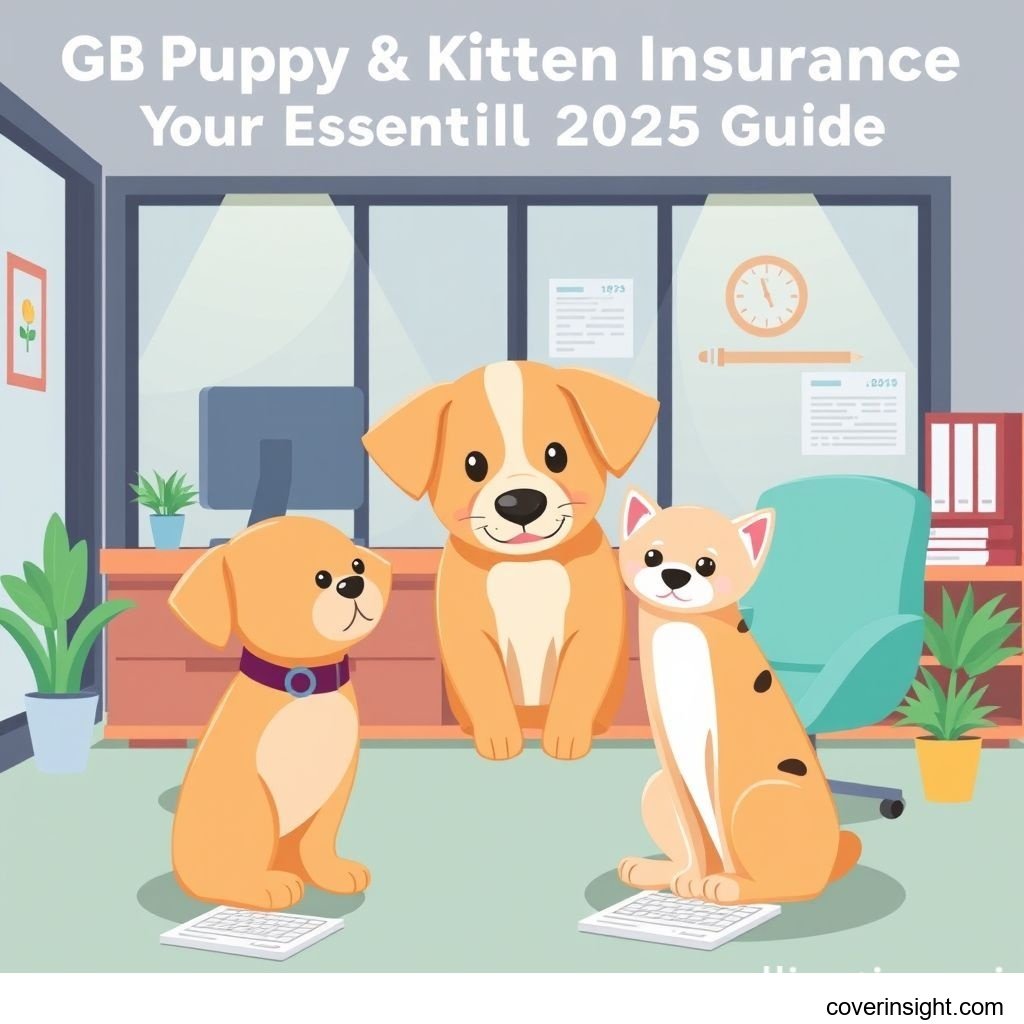GB Puppy & Kitten Insurance: Your Smart 2025 Guide
Introduction
As we step into 2025, ensuring the well-being of our furry family members remains a top priority for pet owners across Great Britain. Puppy and kitten insurance isn't just an optional extra; it's a vital safety net designed to protect you from unexpected veterinary bills that can, quite frankly, make your eyes water. With the rising costs of animal healthcare, understanding the nuances of pet insurance in GB is more critical than ever. This guide aims to equip you with the knowledge to make an informed decision, ensuring your newest family member gets the best start in life without breaking the bank. For a broader perspective on protective measures, you might want to consult Insurance Resources Global.
Coverage Details
What’s Included
Typically, comprehensive puppy and kitten insurance policies in GB cover a multitude of scenarios. You can expect protection for accidents, such as broken bones or poisoning, and illnesses, ranging from common infections to more serious conditions like diabetes or cancer. Most plans will cover veterinary fees for consultations, diagnostics (like X-rays or blood tests), medication, and surgery. Some policies even extend to complementary treatments, like hydrotherapy or acupuncture, if recommended by a vet.
Crucially, many policies offer third-party liability cover, which protects you if your puppy or kitten causes damage or injury to another person or their property – a common concern, especially with boisterous youngsters. Furthermore, you might find benefits for lost or stolen pets, including advertising costs and even a reward. For those looking at a more permanent solution, lifetime policies renew annually, covering ongoing conditions throughout your pet's life, provided you maintain continuous coverage.
Common Exclusions
While pet insurance offers a generous safety net, it's essential to be aware of what's typically not included. Pre-existing conditions are almost always excluded; if your kitten had an ear infection before you took out the policy, future treatments for that condition are unlikely to be covered. There's also usually an initial waiting period (often 14 days for illness) after purchasing the policy before you can make a claim, though accident cover often starts sooner.
Routine preventative care, such as vaccinations, worming, flea treatments, and annual check-ups, are generally not covered. Spaying or neutering, grooming, and elective procedures also fall outside the scope of most policies. Certain hereditary or breed-specific conditions might also be excluded or subject to higher excesses, so it’s always worth checking the fine print, particularly for breeds known for specific health issues.
Cost Analysis
Price Factors
The cost of puppy and kitten insurance in GB can vary significantly, depending on several key factors. Your pet's breed plays a huge role; pedigree breeds, particularly those prone to certain genetic conditions, often command higher premiums than mixed breeds. For example, a French Bulldog puppy, known for potential respiratory issues, will likely be more expensive to insure than a mixed-breed terrier. Age is another critical factor; young puppies and kittens are generally cheaper to insure than older pets, as they're less likely to have developed chronic conditions.
Your postcode also affects the premium, as vet costs can vary regionally. For instance, vet fees in London or the South East tend to be higher than in other parts of the UK. According to data often cited by organisations like the PDSA, the average cost of an emergency vet visit in the UK can easily run into hundreds, if not thousands, of pounds. For context, a 2023 survey indicated that the average unexpected vet bill could range from £300 to over £1,000 for something serious, making insurance a sensible precaution. The type of policy you choose – accident-only, time-limited, or lifetime – will also directly impact the price, with lifetime policies being the most comprehensive and, consequently, the most expensive.
Saving Tips
Looking to save a bob or two on your premiums without compromising on essential cover? Comparing quotes from multiple providers is a no-brainer – platforms like the Association of British Insurers (ABI) can provide useful context on industry standards, accessible at Association of British Insurers. Many insurers offer multi-pet discounts if you're insuring more than one animal. Paying annually instead of monthly can also shave a small percentage off the total cost.
Consider adjusting your excess – the fixed amount you pay towards any claim. A higher excess typically results in a lower monthly premium, but make sure it's an amount you can comfortably afford in an emergency. Maintaining your pet's preventative healthcare, such as regular vaccinations and parasite control, can also reduce the likelihood of claims, keeping your pet healthy and potentially lowering future premiums.
FAQs
-
How much does puppy/kitten insurance cost?
Costs vary widely, but as a rough guide for 2025, expect to pay anywhere from £10-£50+ per month for a puppy or kitten, depending on breed, location, and the level of cover. Lifetime policies will be at the higher end.
-
What affects premiums?
Key factors include your pet's breed, age, your geographical location, the chosen policy type (accident-only vs. lifetime), the level of excess you opt for, and sometimes even the pet's gender.
-
Is it mandatory?
No, puppy and kitten insurance is not mandatory in GB. However, it's highly recommended due to the potentially high cost of veterinary care.
-
How to choose?
Consider your budget, your pet's breed and potential health risks, and the level of cover you need. Lifetime policies offer the best long-term security. Always read policy documents carefully to understand exclusions and claim limits. Checking out resources on GB Insurance Home can also provide a good starting point.
-
Consequences of no coverage?
Without insurance, you are solely responsible for all veterinary bills. This can lead to significant financial strain, forcing difficult decisions about your pet's treatment if an unexpected illness or accident occurs. For instance, imagine a scenario like little Luna, a Jack Russell puppy in Brighton, who ingested a foreign object requiring emergency surgery costing over £3,000. Her owners, thankfully, had a lifetime policy, allowing them to focus on her recovery rather than scrambling for funds. Without it, they might have faced a heartbreaking choice.
Author Insight & Experience
As someone living in GB and a pet owner myself, I've seen firsthand the peace of mind that comes with knowing your furry friend is covered. It's not just about the money; it’s about having the freedom to make the best health decisions for your pet without the crushing weight of a looming bill. Based on my experience, investing in a solid puppy or kitten insurance policy from day one is one of the smartest decisions you can make. It's a proper British safeguard, allowing you to breathe easy and enjoy those precious early years without constant financial worry. Always look for insurers regulated by the Financial Conduct Authority to ensure consumer protection and fair practices.








Comments